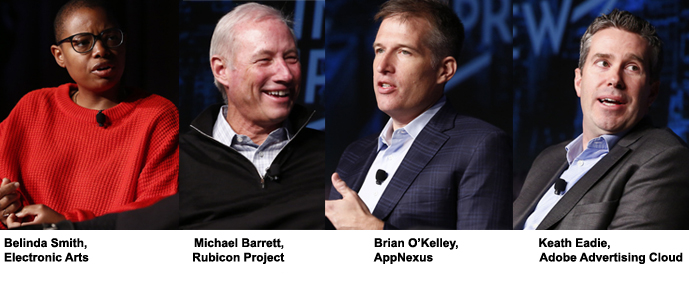
The advertising industry has been plagued by a lack of trust, with vendors, agencies and marketers looking at each other askance. Ad fraud, bad traffic and hidden fees have taken their toll, and while industry players have taken measures to reinstitute their good standing, their work isn’t nearly complete.
During a panel Thursday at AdExchanger’s Industry Preview in New York City, executives from EA, Rubicon Project, AppNexus and Adobe outlined the dark corners that still exist in ad tech.
Delayed Payments
The entire payment system is broken. Brands delay payments to agencies, then agencies delay payments to vendors.
Vendors, consequently, must take out massive lines of credit – hundreds of millions of dollars – to continue operating when they are owed money. And often, these payment delays – which can reach 100 days – are built into the contracts.
Want to work with an agency? Accept a delayed payment.
This is a huge issue for Rubicon Project CEO Michael Barrett.
“My ask is that as we start to lower our rates and we become more transparent, [payment terms] should be on the table for negotiation.”
Mobile Fraud
Mobile fraud, particularly in-app fraud, worries AppNexus CEO and co-founder Brian O’Kelley, because the techniques used to identify bad actors are tied to IP addresses or rely on dropping JavaScript onto a browser.
“We can’t do that with apps,” O’Kelley said. “Everyone here on their cell phone is probably connecting to the same cell tower, which means you all look the same from an ad tech fraud-detection perspective.”
He noted how a flashlight app sends AppNexus a billion impressions a day – and while he doesn’t believe a billion impressions actually come from that flashlight app, he can’t prove it.
“I don’t have a smoking gun signal,” O’Kelley said.
And with Facebook changing its news feed algorithm for organic content, he fears publishers will have to find new ways to generate traffic.
Unfortunately, each remedy has a side effect. The easiest way to be vigilant is to shrink whitelists by focusing on high-quality publishers and buying fewer mid- to long-tail sites.
“That’s good for the internet and for content producers, but it’s hard to convince brands that the next 10,000 sites and apps are worth turning off,” O’Kelley said. “It’s 2% to 3% of reach but 80% to 90% of risk.”
Belinda Smith, global director of media activation at Electronic Arts, agreed that marketers must focus on mobile fraud.
“It shocks me that it’s 2018 and people still do the shit they do on mobile,” she said. “They say things like, ‘Oh, I need more inventory, let’s turn on another network because surely they have unique shit that my first three networks don’t have.’”
International Rebates
The rebate issue is still alive and well internationally, said Keith Eadie, Adobe’s Advertising Cloud VP and GM.
“It’s another competitive dynamic that makes it challenging at times,” he said. “In the US, rebates have generally played out, but internationally, it still exists.”
Data Hygiene
While the industry has had conversations about the quality of location data, said EA’s Smith, those conversations also need to play out for other types of data. To an extent, GDPR will force that discussion.
But Smith also hopes the industry addresses issues of data control and the origin of the data that’s being sold.
“Where did you get it from?” Smith said. “Do you have terms with the originators or suppliers? Often, the answer is no, and that’s concerning.”
This post was syndicated from Ad Exchanger.

More Stories
Go Media becomes Toitū net carbonzero certified
Under the Hood of Tesla’s Fleeting Foray Into Advertising
The Fin Tech Ad Tech Boom; Temu Tops Meta’s Charts (But At What Cost?)